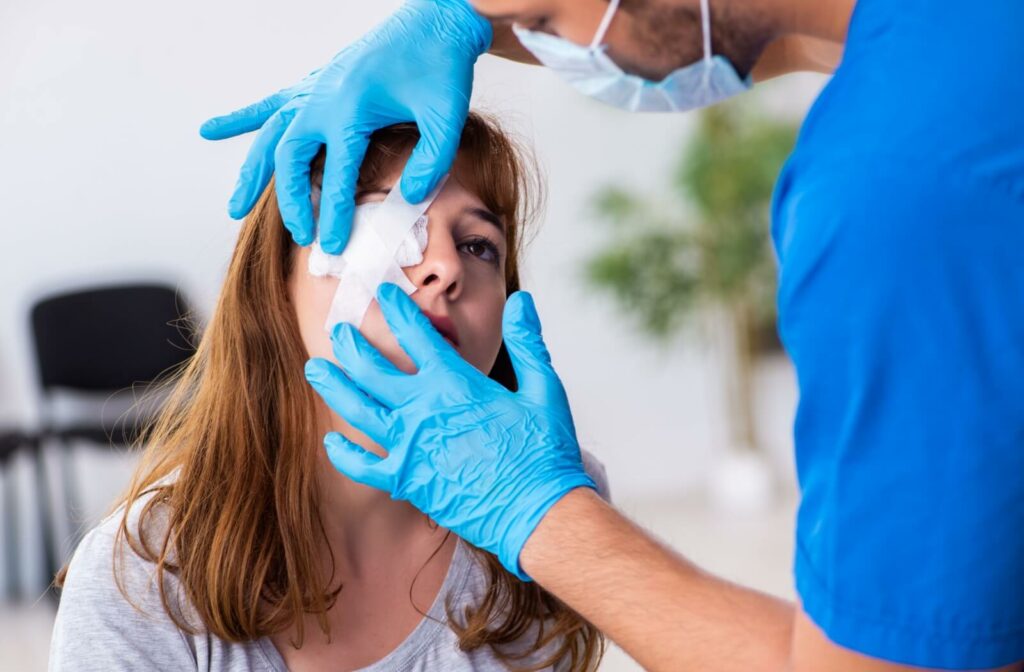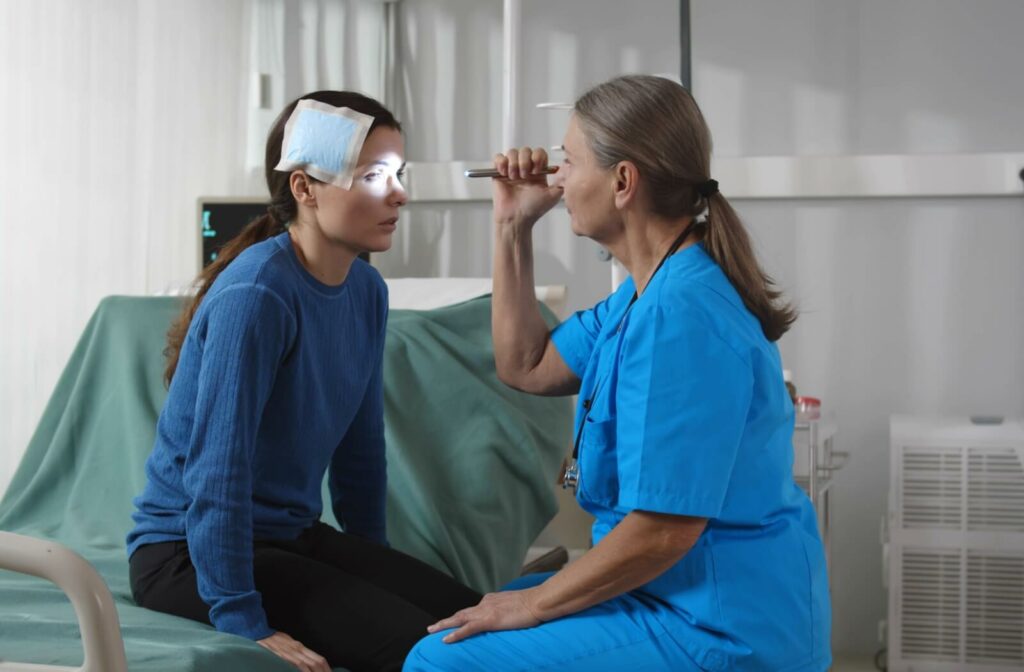An eye emergency can be stressful, and getting the right care quickly is important.
Whether you’re experiencing sudden vision changes, have a bothersome eye infection, or are a worried parent with a child who has an eye injury, your optometrist is here to help.
Optometrists are trained to handle a wide range of eye emergencies. They have the knowledge, resources, and equipment to properly diagnose and treat most eye conditions, keeping your vision safe and healthy.
If you have an eye emergency, contact your optometrist immediately. They can assess your situation and recommend the best course of action, whether an in-office visit or a referral to a specialist.
What Qualifies as an Eye Emergency?
Not every eye issue requires an emergency visit, but some situations demand prompt attention. Here are some signs that indicate an eye emergency:
- Sudden vision loss: Any sudden change in vision, complete or partial, warrants immediate attention. It could signal a serious condition like a stroke or retinal detachment.
- Eye injuries: Blunt force trauma, chemical exposure, or foreign objects in the eye require prompt medical care to prevent lasting damage.
- Severe eye pain: Persistent or intense eye pain can be a symptom of acute angle-closure glaucoma, corneal abrasion, or uveitis. Don’t wait—seek professional help immediately.
- Redness and swelling: Extreme redness, swelling, or unusual discharge might indicate an eye infection like pink eye. While pink eye is not always an emergency, it may need treatment, so it’s best to get it checked by your optometrist.
- Flashes and floaters: Flashes of light accompanied by a sudden increase in floaters could signify a retinal tear or detachment. This is a medical emergency that requires immediate attention to protect your vision.

When to Call Your Optometrist
Think of your optometrist as your primary eye care provider, much like you have a primary care physician for your overall health. They’re there for more than just routine check-ups. Your optometrist is a specially trained eye expert. They only deal with eyes, so they can diagnose your problem and provide immediate care. Their prompt action can make a significant difference in protecting your vision.
Your optometrist may refer you to an ophthalmologist for certain complex eye conditions. Ophthalmologists are medical doctors who specialize in the eye and have the expertise to address advanced eye problems.
Why Choose an Optometrist for Eye Emergencies?
While the emergency room (ER) is vital for life-threatening situations, it’s not always the most efficient choice for eye emergencies.
ERs prioritize life-threatening conditions and managing various medical situations, often leading to extended wait times. This delay can be detrimental to eye emergencies that need prompt attention.
Patients who go to their eye clinic rather than the ER or urgent care center are frequently treated more quickly and efficiently. Most eye clinics offer emergency appointments so you can be seen immediately.
Early Detection Can Help with Emergency Prevention
By maintaining regular check-ups with your eye doctor, you’re not just keeping your prescription up to date. These visits allow for the early detection and management of potential eye health issues before they develop into more serious conditions.
Maintaining a relationship with your eye doctor is crucial in ensuring both the immediate and long-term health of your eyes.
When to see an eye doctor:
- Gradual vision changes: If you notice a slow but steady change in your vision quality, whether it’s increased blurriness, difficulty reading signs or books at your usual distance, or trouble with night vision, it’s time to consult an eye specialist.
- Regular follow-up for chronic eye conditions: If you have been diagnosed with chronic eye conditions such as glaucoma, cataracts, or macular degeneration, regular appointments with an eye specialist are crucial to monitor the health of your eyes and make any necessary adjustments to your treatment plan.
- Family history of eye diseases: If you have a family history of eye diseases such as glaucoma or macular degeneration, it’s important to regularly see your eye doctor for early detection and prevention.
When to Go to the Emergency Room
For severe eye injuries or symptoms that come on suddenly, and if your eye emergency occurs outside of your optometrist’s office working hours, the ER is the next best choice.
The Path Towards Understanding Urgent Eye Emergencies
Knowing where to go during an eye emergency can save valuable time and even your vision. If you’re uncertain if your situation is an emergency, Always err on the side of caution—call us, and we can help.For peace of mind, consider scheduling a routine eye check-up with an eye care professional at Eye Lab in Scottsdale. Regular check-ups can help detect potential issues before they become emergencies.





